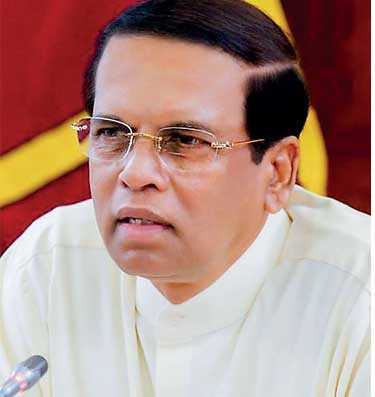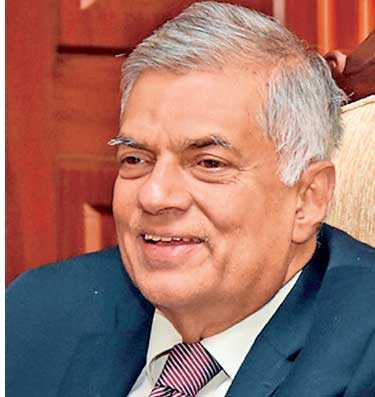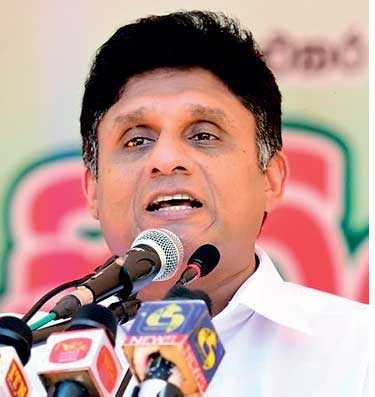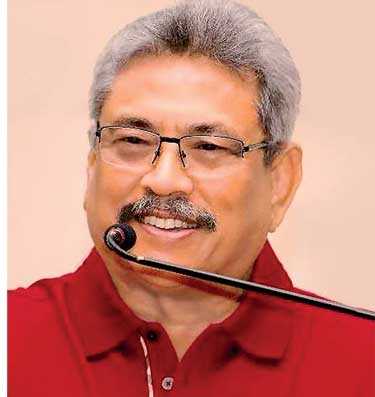Tuesday Feb 17, 2026
Tuesday Feb 17, 2026
Monday, 19 August 2019 00:00 - - {{hitsCtrl.values.hits}}
 |
 |
President Maithripala Sirisena |
Prime Minister Ranil Wickremesinghe |
 |
 |
Sajith Premadasa |
Gotabaya Rajapaksa |
President Sirisena is a few months away from completing his tenure as the President of this country. Despite his ability to seek re-election, he is likely not to do so as his popularity has plumped ever since he was installed to the top most position in the country. He is certain to go down in history as the least successful Executive President the nation has ever had.
The ‘Good Governance’ concept championed in the lead up to the 2015 Presidential Election had become a mere fallacy. Economic progress was at a slow pace with the brunt of the impact felt by the corporates and the people.
Allegations of corruption and malpractice, which was home to the Rajapaksa regime have overshadowed this Government, through incidents such as the Bond Scam. Still no convictions have been proven on many such allegations of both regimes. Presidential commissions, FCID and Parliamentary Select Committees took the headlines during the past five years. However, neither measure have been successful in apprehending the culprits.
Despite the disappointment, the Good Governance Government paved the way for a system open for criticism and change. A country that could create a space for diversity and democratic discussion. The passing of the right to information bill and independent commissions were great deeds of work that materialised.
Common candidate and National Government fiasco
The surprise defection and subsequent win of President Sirisena marked the opening of a new political era within the country, with the National Government formed among the two main political parties at that time, UNP and SLFP. 
Although the SLFP joined the coalition with the UNP, it was only the fraction loyal to Sirisena and the ones seeking ministerial privileges, obliged. It was essential for both parties to work together, as neither had a majority and both retorted at their disgust against the Rajapakshe era. However, the journey was a constant tug of war between both elements.
Delays and indecision in policy formulation and implementation, and decision making served as the cornerstone in the redundant affairs of the Government. Half a century long differences in national policy between both the political parties, came to light, as neither party was able to work in unison to drive notable results.
This caused in an unsuccessful political coup in October 2018 steered by Presidents Sirisena and Rajapaksa. The fragile political relations led to the deterioration in the administration of law and order and security, paving the wave for an unforeseen terror attack that further dented the nation’s progress forward.
President Sirisena’s impenitent assent to the leadership of the SLFP, meant that he was under pressure to lead the path to form a SLFP led Government in 2020. President Sirisena’s efforts to lure loyal Rajapaksa followers to his side failed, as they still perceived his defection and subsequent nomination as the common candidate, a betrayal.
President Sirisena’s political inability to overpower the Rajapaksa foothold led to the demise of his second term as President and the fall of the SLFP as one of the main political parties.
It is also a question if the SLFP members in Government had the best interest of the country or Government in mind during their service years. Most SLFP members were reserved about the investigations carried out on the wrong doings of the Rajapaksa regime, especially the Rajapaksa family and their henchman, whom they were constantly loyal and afraid to contravene.
Key candidates and their political dynasties
At the point of this article was sent for print, the Sri Lanka Podujana Peramuna (SLPP) had appointed former Defense Secretary Gotabaya Rajapaksa as their Presidential candidate. Public endorsement of Gotabaya forced him to be made the most eminent choice among byte key decision makers of the party, the Rajapaksa family. The UNP is likely to appoint Sajith Premadasa, the most popular member of the party as its pick for the candidacy. The other probable choice from the UNP is Speaker Karu Jayasuriya.
Gotabaya Rajapaksa remains the favourite to clinch the post. However, the outcome may hinge on his ability to officially gain the endorsement of the SLFP. The million and above votes of the SLFP may hold the deciding factor in determining the fate of a future President Gotabaya.
|
Anura Kumara Dissanayake |
Popularity of Gotabaya soared after the recent terror attack, as the country’s most pressing issue tipped to safety and security. In retrospect, the support of the minority parties and their voter base in the North and East and even in the upcountry tea estates may determine the fate of a future President Premadasa.
Gotabaya, the younger brother of the former President, was instrumental in eradicating terrorism from the country, ending the 26-year war. However, he has not been too distant from any controversy, as he is widely accused of being the mastermind behind many abductions and killings using the famous ‘White Van’ concept.
Accusations have also been levelled against large scale financial scandals relating to defence procurements. Despite the rhetoric by all anti-Rajapaksa forces, neither of such allegations were proven, much to the irony of the people that voted for a change in 2015.
A populist view remains that Sri Lanka is in need of an Authoritarian administration to bring discipline and autonomy in decision making and implementation. Some rekindle the effectiveness of such a rule, basing their misperceived judgement on the era of President Rajapaksa, on how such administration aided to eliminate terrorism and initiated large scale mega projects.
The surprise defection and subsequent win of President Sirisena marked the opening of a new political era within the country, with the National Government formed among the two main political parties at that time, UNP and SLFP Sajith Premadasa, the son of the former President Ranasinghe Premadasa, is the most prominent and only choice to challenge Gotabaya The other candidates on offer do not present a formidable case to be considered for a vote, based on the lessons learnt with the Good Governance years
However, the existence of democracy, equality, transparency and freedom, which is at the centre of any progressive development, was a rarity during that time. The question is whether people are whiling to sacrifice these societal virtues to establish an authoritarian rule.
Sajith Premadasa, the son of the former President Ranasinghe Premadasa, is the most prominent and only choice to challenge Gotabaya. Sajith Premadasa remains the sole minister that has fulfilled his role as the Minister of Housing and Construction, to the fullest.
This has been despite the peoples despair at the present Government and its leadership. His success is attributed to the dedication and determination to resolve the housing need in the country by 2025. He also embarked on the deep challenge of serving one party and country, and by no means embraced another political party or another nation’s citizenship in the process, despite his ability to do so.
Premadasa continues to proclaim that he will continue the work of his late farther. President Premadasa was very astute politically, as he was able to understand and serve the most acute needs of the most underserved masses of the country, through numerous projects such as ‘Gammudawa’.
He was also instrumental in driving an industry revolution through the apparel industry of the country, which today has become a key foreign exchange earner. However, President Premadasa was also a clear executer of an authoritarian rule. Their remains allegations that is yet to be proven, about his work to suppress the freedom of speech on those that went contrary to his beliefs and the perceived arming of the Eelam Fighters at that time.
Challenges at hand for the next leader of the country
Safety and security remains the most pressing issue of the country following the Easter Sunday attacks. Despite of the prompt action taken to apprehend most of the terror suspects is commendable, the inaction and the void in the security framework for such an incident to happen is a serious concern. Ensuring a stringent security framework is in place within the country is going to be paramount.
The recent attacks have also further fuelled to disrupt the ethnic unity among the nationalities. As long as our policymakers do not find a solution to the issues of the other ethnicities, the country would not press ahead to prosperity. The country will be not get reconciled by passing laws.
Legislators can only create a framework but it is their ability to drive the executive arm of Government to implement the results that would matter in the end. As with ethnicities, strong bonds will have to be formed with nations with a strong international relations policy favouring not only China, USA and India.
Ties in the past have hinged on the material and financial benefits that such nations have offered. International relations have to be built to bridge the technology void, skill gap, and drive FDI to the country.
Despite the statistics showing a 3% + growth rate, the economic benefits has not materialised in a meaningful manner to the people. It is well perceived that the economy was moving slowly than a snail in the Yahapalanaya years.
Many were made to expect wonders with election of the UNP Government, and have been made to ponder on the sorry state of affairs of their businesses. The Government resorting to many unpopular policies of raising taxes and the growth in interest rates, following the bond scam, hindered the purchasing power of the economy.
This has led to the slowdown in the cash cycle which has led to the downturn in business momentum. Many measures were applied by the Government, such as numerous concessionary loan schemes, however, their results would only materialise in the next year or two.
The next leader has to also have the courage to drive a string of unpopular measures to drive an attitude change and foster growth. These include driving down the cost burdened public sector, move from a welfare state to a savings driven state, and foster a public-private partnership framework. Similarly, foreign collaborations have to be formed to inculcate the required technology transfer industry and skills transfer to our labour force.
Would it be prudent to vote for the candidates that are not backed by a major political party?
It certainly would not be prudent. If there is a lesson that has to be learnt from the political coup initiated by President Sirisena and the former President, the lesson would entail that the support of Parliament is paramount to succeed in the nations Governance. Neither of such candidates can foster such nationwide support to begin with.
It is vividly evident that the most prominent political forces have failed, so much to the people’s disgust and distress. Most would prefer a candidate outside the main political domain to emerge, similar to Emmanuel Macron of France.
The first step in that effort should be to build a strong nationwide political movement that could transcend to a political party, which could garner the confidence of the people. The movement must win support of all ethnicities and by doing so furnish the ability to form a unitary Government, without having to concede too much to minority parties, in their quest to govern.
Even the National Alliance of Alternative Forces, a movement backed by many organisations to drive change doesn’t seem to have gained the required momentum. Further, unlike France the political literacy level in Sri Lanka is very low, so a candidate not backed by a major political party emerging victorious will not be possible.
What would the future hold for the premier and former President?
As it stands today, Premier Wickremesinghe cannot get elected and the former President cannot contest. However, neither of them seem to have indicated their willingness to handover the baton to their successor. This would imply that the duo would be planning another constitutional alteration, similar to the 19th Amendment, which disempowers the Executive President, in favour of Parliament and the Prime Minister. This would allow them to gain a controlling foothold in State affairs.
In the event Gotabaya is elected President, much would depend on how he works in unison with his brother and his loyalists. This would be the key success factor of a future SLPP Government. If Gotabaya resorts to contest the leadership of the party by ousting President Rajapaksa after building his set of followers, the repercussions can be more detrimental than with the Good Governance regime.
As in the past, the contest for the leadership would be inevitable when Gotabaya sits at the helm. The fate of Premier Wickremesinghe would also follow a similar suit if Premadasa is elected.
Conclusion
The time has come to transfer the political leadership to a new generation of leaders and for the old folks to handover that baton. The next battle will be a technological war and not a conventional war and we do not need old generals to lead that effort.
Our country has youth full smart officers in our defence forces and they should be the ones leading the security measures in the years ahead. It is only the Constitution and law that must hold us together and not a dictatorship.
The challenge for the top job rest with two candidates, namely Gotabaya Rajapaksa and Sajith Premadasa. This would be given Gotabaya Rajapaksa won’t face any impediment from the revocation of his American citizenship and Sajith Premadasa gets the nod from the UNP.
The other candidates on offer do not present a formidable case to be considered for a vote, based on the lessons learnt with the Good Governance years. The success of the next leader is totally dependent on how he can garner the majority support of Parliament.
Gotabaya has emerged as the front runner to the Presidency with the recent terror attacks. However, the pendulum can swing in favour of Sajith Premadasa if many other aspects are considered such as economic development, democracy, transparency, equality and freedom of speech.
(The writer is the Managing Director at Elon Venture Catalysts Ltd., a financial and investment banking services firm operating in Sri Lanka. He is also the founder of Accounting and CFO services firm Cotlersys and Retinue. He has a BEng (Hons) in Chemical Engineering degree from the University of Nottingham, United Kingdom and a MBA (Marketing) from the University of Colombo. He is also a Chartered Financial Analyst. Vidushan holds a Certified Management Accountant (Australia) and Certified Global Business Analyst (Australia). He is currently reading for his Doctorate in Business Administration from the University of Colombo. He can be reached via email on [email protected] or www.elonventure.com)